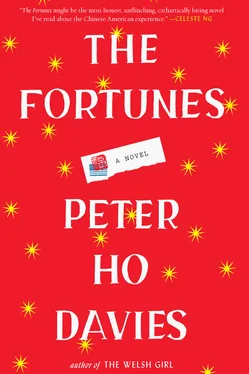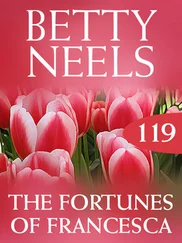For her part, she tries to play the role of the good daughter, both while the camera is rolling and when it’s silent, but it’s all an act. She bows to her stepmother, bows to her half-brother. (“You’re older than I thought,” he tells her; “You’re exactly as I imagined,” she replies, proffering the watch.) Her father expects her to stay. He has plans to marry her off finally. “What about him?” he whispers, glancing at Newsreel. She flushes. For some, she knows — old-timers, country folks — there remains a whiff of incest to marriage between people with the same clan name. That’s how Chinese he is. That’s how desperate.
The pause stretches out until the camera ticks to a stop. Her father cocks his head, as if waiting for an alarm to go off.
In Shanghai she had attended a mass wedding at the invitation of the mayor: the brides in pastels (white being a funeral color), their veils made of mosquito netting. All those young men and women paired up and arrayed before her, as far as the eye could see. Newsreel’s camera panned slowly from her stricken face over the crowd. She edged a little closer to him, the pair of them on the dais like a couple on a cake.
“Mr. Wong,” she whispers now, “are you ready?” He raises the camera like a mask.
“This is what we Chinese do,” her father continues. “We go to Gold Mountain, get wealthy, come home. It doesn’t matter how you make money. I tell them I was a big-shot merchant, not a laundryman. There I was nothing, here I live like a king.” It’s true, she sees. He’s a respected and famous figure in the village, resplendent in his long silk changshan and plush homburg (at home he’d favored Western shirts and pants, figured his customers would trust him with their clothes if he wore the same as them), and she’s happy for him, understands why he’s returned.
For a moment it all makes sense. Why come so far, after all, if not to stay? If Hollywood has rejected her, why not reject Hollywood? But she can’t. Filial devotion has its limits. There, she thinks, I’m still a star, if a little tarnished; here I’m a daughter.
“But you’re Chinese,” her father insists, pressing the ferrule of his cane into the dirt. They are standing on a dike above a paddy field, silhouetted against the sky. “Don’t you ever get homesick?”
“Always,” she sobs.
“Well, this is where you belong.”
But she shakes her head. “There I’m Chinese, here I’m American.” Her homesickness is incurable. “ You’re supposed to be my home,” she whispers.
They both look away, into the camera, until it winds down. And even then, in the silence, Newsreel keeps it pressed to his face.
At night she lies awake, listening to the sizzling buzz of insects. Newsreel won’t come to her in her father’s house. At least she’s brought a flask.
When it’s time to leave, she stages a little scene: father and daughter holding hands, moving apart, arms extended until finally contact is broken. And walking backward out of frame.
“Cut,” Newsreel says. She sighs, shakes out her arms. She misses the stark theatricality of silent pictures.
“You were great,” she tells her father, and he looks confused.
She pushes the tears away with the heel of her hand. “They used to say I was the best crier in pictures,” she tells Newsreel. A prized talent in the silent era. “People used to crowd onto the set just to watch me weep.”
At the station, waiting in the flickering shade of a ginkgo tree, her father takes Newsreel’s hand. “Thank you for taking good care of this daughter.” He bows stiffly; she notices that the tips of his bushy eyebrows are silvering.
“Sorry about that,” she murmurs afterward, leaning against Newsreel in the compartment. “It’s just that he sees us together all the time. He doesn’t understand. I hope you weren’t offended.”
“Oh, that?” Newsreel says. His cheeks hollow as he draws on his cigarette. “No. Not at all.”
“Ah,” she says, straightening. It’s suddenly spelled out like a title card in a silent picture. “You never told me you were married. No wonder you think I’m a slut.”
There’s a clatter of applause, and a formation of wild ducks rises from the marshes along the tracks, flies into the sun.
PUBLIC
They spend their last two days in Hong Kong, avoiding each other. But back in Shanghai, she insists Newsreel accompany her to the Public Garden in the International Settlement. Its English lawn is said to be as tightly trimmed as the nap on a billiard table. She wants to see the carp pond, the band pavilion, the infamous NO DOGS OR CHINESE sign. She wants him to film her beside it, flouting it. When he balks, she tells him, “Oh, don’t fret, they won’t arrest me. I may be a bitch, but I don’t think it applies. Do you?” She twirls her scalloped parasol nonchalantly.
No footage survives, if the excursion ever took place.
WONG
She says goodbye to Newsreel at the docks—“Thank you, Hai-sheng,” she whispers — but he continues to film her as she waves from midship, from behind a veil of red-white-and-blue streamers. She blows him a kiss.
She has grown fond of him. They’ve enjoyed a few laughs.
Between them, she and Newsreel have heard them all.
Wong time.
Wong place.
Wong number.
When she introduces him, they take it in turns, after a beat, to add, “No relation.”
“Newsreel Wong and Film Star Wong — we could be a double act.”
Except she is also Shameless Wong, Spinster Wong, Stinking Whore Wong, American Wong.
“You really never saw one of my pictures?” she teased him in the taxi to the ship.
“Some were banned, as you know. And, to be frank…” He shrugged. “I don’t really care for movies, make-believe.”
“Now it can be told!”
“But which ones should I see? To remember you by. My friends at the studio can get prints.”
“Oh.” She squeezed his hand, smiled wanly. “None of them.”
She plucked the pocket square from his breast before they parted, “to remember you by”; flourishes it flailingly now from the deck.
“Fifty million Chinese,” she shouts down to him over the ship’s horn.
“What?” he yells from behind the Eyemo. She wishes he’d put it down, let her see his face one last time.
“Fifty million Chinese,” she tries again. He cups a hand to his ear. “Fifty million Chinese can’t be Wong!” But he just keeps filming.
And Wong can’t be fifty million Chinese, she thinks ruefully as she watches the crowded pier, sailors and stevedores, dwindle into the distance. She waves until he is out of sight, then presses the handkerchief hard to the corner of each eye in turn, as if to stanch a wound.
It’s her one and only visit to China.
HALF-CASTE WOMAN
The first night onboard, she sings in the lounge— Drink a bit, laugh a bit, love a little more— leaning into the curve of the white piano. If Americans think her Chinese and Chinese think her American, the British understand her as Eurasian.
Half-caste woman, what are your slanting eyes
Waiting and hoping to see?
She met Noël Coward once at a club in London. He’d famously written Private Lives while recuperating from flu in Shanghai. She told him how strange it felt to have English hotel staff pressing her gowns, chanced a sally: “Is that what you’d call iron-y?” “What say?” he asked absently, simpering at someone across the room. “Quite so. Irony,” he affirmed, correcting her pronunciation.
Scanning the far horizon,
Wondering what the end will be.
Later, on deck, tumbler in hand, she’ll crane over the rail. She searches the moonlit distance for a funnel, for a spout. For a husband, she thinks, but all of them might as well be lined up at the Long Bar, longest in the world— naturally! — at the men-only Shanghai Club. Plenty more fish in the ocean, ha! Flecked with moonlight, the waves glint like teeth, rings of them radiating outward like the maw of a shark. She hangs further out, gazing down into the water rushing past, trying to imagine those jade depths. What would it be like to dive in? To lie back and watch the towering hull slide past on the screen of the sky and slowly sink into the velvety dark? And yet it’s the surface, as ever, waves shimmering like scales, that beguiles her. The chop clapping the hull, the lacy veils of spray, the whirling foam wreaths. And why not? she thinks. We live on the surface, after all. The surface supports us, cradles us, buoys us up. She spies, suddenly, the sleek curves of dolphins running alongside, their dark, shining backs rising and falling, turning like film on a spool. She lets her glass drop into the darkness, brings her gloved hands together in silent applause.
Читать дальше












